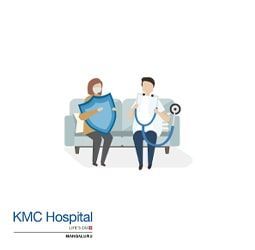
KMC Laboratory Mangalore
Silver Health Check
Basic health
Regular health
Taking care of one's health is extremely necessary in today's busy and stress filled lifestyle. This silver package offers a thorough basic checkup for the wellness of your body.
The health check package includes CBC, fasting blood sugar, lipid profile, glycosylated Hb, TSH, serum uric acid, SGOT, SGPT, total bilirubin, blood urea, serum creatinine, urine analysis, xray - chest, ECG, ultrasound scan - abdomen - pelvis, and physician consultation.
Hemoglobinopathy-evaluation
To investigate hemoglobinopathy as the cause of signs and symptoms to screen for a hemoglobin disorder
Specimen:A blood sample drawn from a vein in your arm or obtained from the heel or finger of an infant
When To Get Tested: As follow up to abnormal results on a complete blood count CBC and or blood smear when you have symptoms of hemolytic anemia such as weakness and fatigue and your healthcare practitioner suspects that you have an abnormal form of hemoglobin hemoglobinopathy when you have a family history of hemoglobinopathy as part of newborn screening
Test Preparation:None
Normal Test Result: Hemoglobin A1(HB A1): about 95%-98% Hemoglobin A2 (Hb A2): about 2%-3%
Lipid-panel
To assess your risk of developing cardiovascular disease CVD to monitor treatment
Specimen:A blood sample obtained by inserting a needle into a vein in your arm or from a fingerstick
When To Get Tested: Screening when no risk factors present for adults every four to six years for youths once between the ages of 9 and 11 and again between ages 17 and 21 Monitoring at regular intervals when risk factors are present when prior results showed high risk levels and or to monitor effectiveness of treatment
Test Preparation:Typically fasting for 9-12 hours water only before having your blood drawn is required but some labs offer non-fasting lipid testing Follow any instructions you are given and tell the person drawing your blood whether or not you have fasted For youths without risk factors testing may be done without fasting
Normal Test Result: the ratio should be below 4
Thyroid-stimulating-hormone-tsh
To screen for and help diagnose thyroid disorders to monitor treatment of hypothyroidism and hyperthyroidism
Specimen:A blood sample drawn from a vein in your arm or from pricking the heel of an infant
When To Get Tested: For screening Newborn screening is widely recommended however there is no consensus within the medical community as to the age adult screening should begin or whether screening should be done For monitoring treatment as directed by your healthcare provider Otherwise when a person has symptoms of hyperthyroidism or hypothyroidism and or an enlarged thyroid
Test Preparation:None needed however certain medications can interfere with the TSH test so tell your health practitioner about any drugs that you are taking If you take thyroid hormone as treatment for thyroid disease it is recommended that your blood sample be drawn before you take your dose for that day
Normal Test Result: from 0.4 mIU/L to 4.0 mIU/L for those with no symptoms of an under- or over-active thyroid
Uric-acid
To detect high levels of uric acid in the blood which could be a sign of the condition gout or to monitor uric acid levels when undergoing chemotherapy or radiation treatment to detect high levels of uric acid in the urine in order to diagnose the cause of kidney stones and to monitor those with gout who are at risk of developing such stones
Specimen:A blood sample drawn from a vein in the arm or a 24-hour urine sample
When To Get Tested: When you have joint pain or other symptoms that your healthcare practitioner suspects may be due to gout when you have had or are going to have certain chemotherapy or radiation therapies for cancer when you have recurrent kidney stones when you have gout or are otherwise at risk for kidney stone formation
Test Preparation:None may be needed however some institutions recommend fasting Follow any instructions you are given
Normal Test Result: 2.4 mg/dL -6.0 mg/dL (female) and 3.4 mg/dL -7.0 mg/dL (male)
Total bilirubin
To screen for or monitor liver disorders or hemolytic anemia to monitor neonatal jaundice
Specimen:In adults a blood sample drawn from a vein in the arm in newborns a blood sample from a heelstick non-invasive technology is available in some healthcare facilities that will measure bilirubin by using an instrument placed on the skin transcutaneous bilirubin meter
When To Get Tested: When you have signs or symptoms of liver damage liver disease bile duct blockage hemolytic anemia or a liver-related metabolic problem or if a newborn has jaundice
Test Preparation:You may need to fast nothing but water for several hours before the test fasting requirements vary by laboratory ask your lab or healthcare provider for instructions
Normal Test Result: less than 0.3 mg/dL (less than 5.1 µmol/L) Total bilirubin: 0.1 to 1.2 mg/dL (1.71 to 20.5 µmol/L)
Fasting Blood Sugar
This is the test that measures blood sugar levels. Elevated levels are associated with diabetes and insulin resistance, in which the body cannot properly handle sugar.
Complete Blood Count
To determine your general health status; to screen for, diagnose, or monitor any one of a variety of diseases and conditions that affect blood cells. A blood sample is drawn from a vein in your arm or a fingerstick
SGOT
SGPT
-
9 Tests Included
-
- Hemoglobinopathy-evaluation
- Lipid-panel
- Thyroid-stimulating-hormone-tsh
- Uric-acid
- Total bilirubin
- Fasting Blood Sugar
- Complete Blood Count
- SGOT
- SGPT
Pay Online Pay at Center
₹4250.00
₹5000.00
15% OFF








